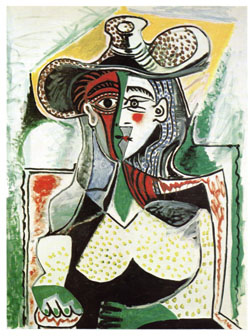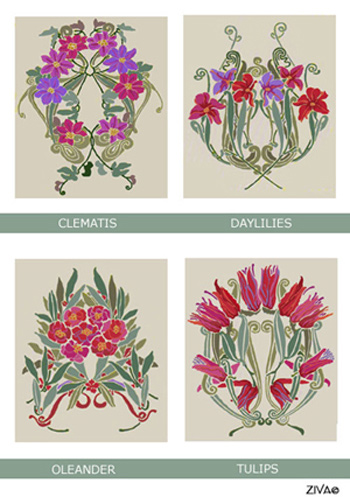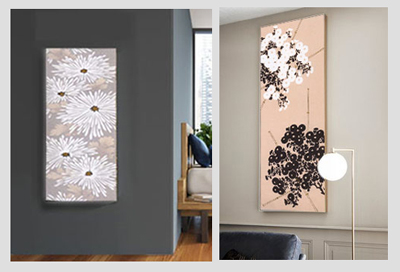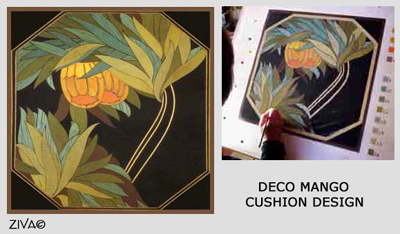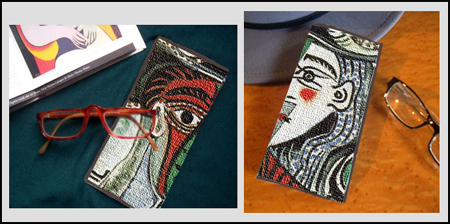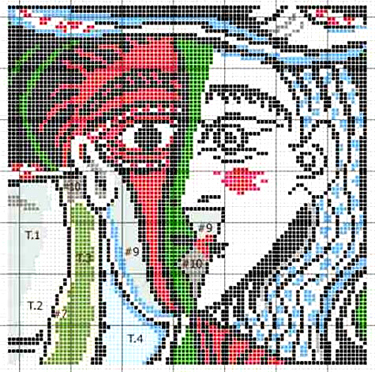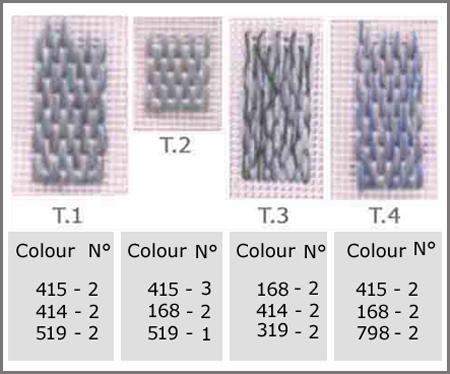| Back to Back Issues Page |
 |
|
VIVA ZIVA ! newsletter: Volume # 2128: FREE GLASSES CASE DESIGN April 02, 2021 |
V I V A Z I V A ! n e w s l e t t e r ▪volume number: 2128▪ FREE GLASSES CASE DESIGN INSPIRED BY PICASSO’S PAINTINGS OF WOMEN ▪
Thanks so much for subscribing to the VIVA ZIVA! Newsletter. We’ll be issuing a newsletter regularly, with a new freedesign each time... exclusively created for the VIVA ZIVA! newsletter. One of our RECENT PAINTINGS…. an ART DECO cushion design called ‘Deco Mango’ inspired TWO NEW DESIGNS of Art Deco cushions in the same theme! Have a look! ….PLUS…… NOW AVAILABLE! ……NEW JAPANESE STYLE WALL ART DESIGNS …and more ‘floating’designs for our FRENCH COUNTRY GARDEN COLLECTION.And…… a FREE GLASSES CASE DESIGN BASED ON THIS 1962 PICASSO PAINTING!
We have adapted part of this Picasso painting from 1962 to create a graphically dynamic glasses case design called ‘TWO FACE’ Other free designs? ……. Click here to see our newsletter back issues with free designs that may interest you!
WHAT’S IN EACH VIVA ZIVA! NEWSLETTER?
NOW AVAILABLE …FOUR NEW ART NOUVEAU DESIGNS FOR OUR FRENCH COUNTRY GARDEN COLLECTION !
We adapted FOUR original Art Nouveau 1907 floral motifs to create “floating designs” for SEAT COVERS or CUSHIONS .
For seat covers , these ‘floating’ motifs are all approximately the same size creating a set of 4 for your dining room. You could repeat two of the designs to make up a set of 6 OR make each one twice for a set of 8 OR make up the number you need with just one design. Lots of possibilities! YOUR CHOICE. For cushions, the ‘floating’ motifs are also all approximately the same size, but slightly larger than the seat cover motifs. Go to our SHOPPING PAGES for details about sizes. DYNAMIC COLOURS For the four motifs, we have selected the same range of warm to cool greens in the leaves for each design to complement the dynamic flower colours of reds, fuchsias and blue violets. We’ve kept the background colour neutral in each case (light grey), so you can see the design details. However, the background colour and even the flower colours can match the colour scheme in your home décor. Make it yours uniquely!
ALSO NOW AVAILABLE …NEW JAPANESE STYLE DESIGNS FOR WALL ART! We adapted our two new wall art designs from rare colour Japanese woodblock images from the 1930s.
‘CASCADING CHRYSANTHEMUMS’ (Image above left) We created a delicate and rhythmic cascade of white chrysanthemum flowers with a disciplined palette of just off-white, greys and taupes so the focus of the design is completely directed to its asymmetrical composition. .‘TIMELESS CHRYSANTHEMUMS’ (Image above right) These two chrysanthemum motifs have been placed asymmetrically on a wall art needlepoint panel in a disciplined palette of neutral black and white flowers, black stems and leaves…. and set off by a soft ‘cherry blossom’ colour for the background.
For more details about these designs, go to our Japanese Wall Art Collection!
We have the same minimalist Japanese designs available as CUSHIONS, if you want to stitch something smaller!
RECENT PAINTINGS
This Art Deco cushion design is one of our more popular motifs……. having painted it several times for clients all over the world!
Its Modernist motif was inspired by a train…. the Orient Express! The Venice-Simplon Orient Express was the archetypal train of the Art Deco era. The 1920’s sleeping cars featured Lalique glass panels, Florentine upholstery and ornate Deco marquetry panels . We adapted one of these decorative marquetry panels to create the cushion design “DECO MANGO” .
NEW DESIGNS COMING SOON! ……. TWO MORE ART DECO DESIGNS FROM THE ORIENT EXPRESS! We’ve now adapted two more Modernist marquetry panel motifs from the Orient Express to complement our Deco Mango design. We have repeated the same angular border detail and cushion sizes in all three cushion designs so they will work together in your décor.
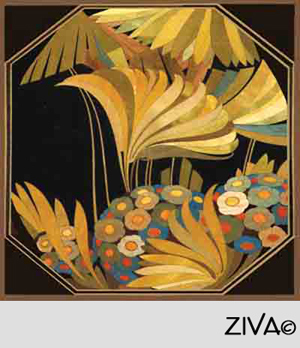
DECO TROPICAL FLOWERS The sinuous stylized leaves in palette of soft warm greens, browns and golds envelop an array of small tropical flowers in a range of blues, greens and golds. Its exotic and graceful style typifies the era. 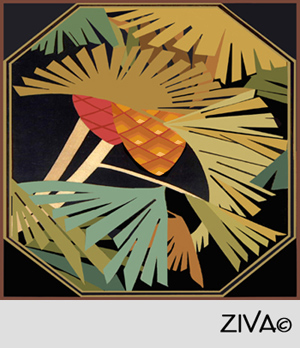
DECO EXOTIC FRUIT This time we propose a much bolder graphic leaf design with similar leaf colours as the Deco tropical flowers’ motif, plus an addition of a range of soft blue-greens. For the fruit, we created a classic Art Deco motif of diamond shapes in gradated colour range of red-orange, rust-orange, golden-orange and gold….. graphically resembling the exotic ‘Pandan’ fruit.
YOUR STITCH/TECHNIQUE TO TRY To create Picasso’s painterly texture for parts of the glasses case, we combined the Straight Gobelin Stitch with the Technique to Try! Stunning Results! STRAIGHT GOBELIN STITCH 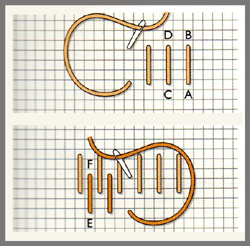
The diagram to the right shows you how to stagger the Straight Gobelin stitch row by row over four threads .We used this stitch on the glasses case only in the same sections as the Technique to Try.
YOUR TECHNIQUE TO TRY This technique helped us to recreate Picasso’s painterly textures for some parts of the glasses case! 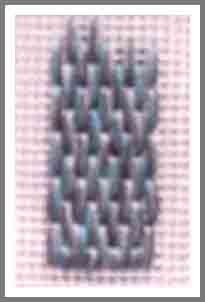
We started with DMC’s Mouliné Spécial 6-ply thread and separated the strands to create several different colour combinations to make up one 6-ply thread and stitched it in the Staggered Gobelin Stitch (photo left) and the regular Tent Stitch. What did we discover?
We selected four different combinations for this design which we have outlined in the glasses case chart and colours listing below. PRACTICE THE STAGGERED GOBELIN STITCH WITH THE TEXTURED TECHNIQUE FIRST! If you need to practice our Gobelin Stitch first with the texture technique, practice on a piece of 13hpi gauge interlock canvas first until you feel you have mastered it!
FREE DESIGN 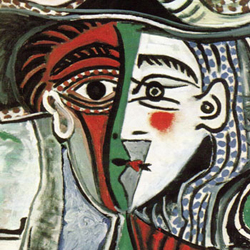
We focused our design concept solely on the woman’s face from the 1962 Picasso painting. Please note the different textures of grey tones in the bottom left sections of the painting. These are the sections where we have used the textured and staggered Gobelin Stitch (details of their distribution below). By folding over the square design to create the glasses case, we’ve created two different facial features and colour schemes for the same face - one for each side of the glasses case - called ‘TWO FACE’!
The size of the total stitched area of the case, as shown in the photos above, is 7” x 7” (approx. 18 cm x 18 cm), be-fore it is folded to create a the final glasses case size at approx. 31/2” x 7” (9 x 18 cm). Ample size for most glasses to fit comfortably. THE COLOURS With our selection of yarns, we tried to stay true to Picasso’s colour palette of red-rust, warm green, blue and a neutral range of white, greys, blue-greys, and black.
READING THE CHART: GLASSES CASE CHART
FOUR TEXTURES FOR GLASSES CASE AND THEIR CODES
YARN COLOURS All the yarns for the Picasso glasses case were chosen from DMC Mouliné Spécial 6-ply cotton range of colours. They are readily available at your local needlepoint shop or online.
YARN QUANTITIES As a guide for the glasses case threads, you will require approximately the following 6-ply cotton thread quantities:
OTHER MATERIALS You will also need :
Go to the ZIVA site for more detail info on the MATERIALS required.
MAKING UP SUGGESTIONS
It’s now ready to use! Congratulations!
ASK THE ZIVA DIVA! QUESTION: Hi ZIVA, Is a combo silk and wool thread strong enough for a footstool? Thanks, Kathy
ANSWER: Hi Kathy, Thanks so much for contacting us at ZIVA Needlepoint Designs. There are many factors to determine the practicality of using a silk/wool blend on an item of upholstery, such as the size of the footstool top and the amount of use (therefore wear and tear), the footstool will receive. Also, what is the gauge of canvas you are using? The tighter the gauge, e.g. 18 holes per inch, creates a tighter stitch, which could protect the yarn more than say 10,12 or even 14 holes per inch. Does the footstool design allow you to pick out small parts of the motif, where you could select a silk/wool blend thread and then stitch the rest in wool? Wool is still the best fibre, when stitching upholstery items. I, personally, would be very wary of the risk of using this blend of fibres for the entire piece, after spending several months stitching the canvas plus the additional cost of the silk/wool threads. A lot to consider. I hope the above has been some help in making your decision. Best regards, Sylvia McLeod
WHAT NEXT?
The next VIVA ZIVA! Newsletter #2129 will be issued in the fall of 2021 . I’ll be including:
Please contact me if there is a particular stitch or technique you’d like me to use for a free design in a future newsletter!
Share this newsletter with friends and relatives. Looking forward to sending you the next newsletter! Sylvia McLeod
|
| Back to Back Issues Page |
